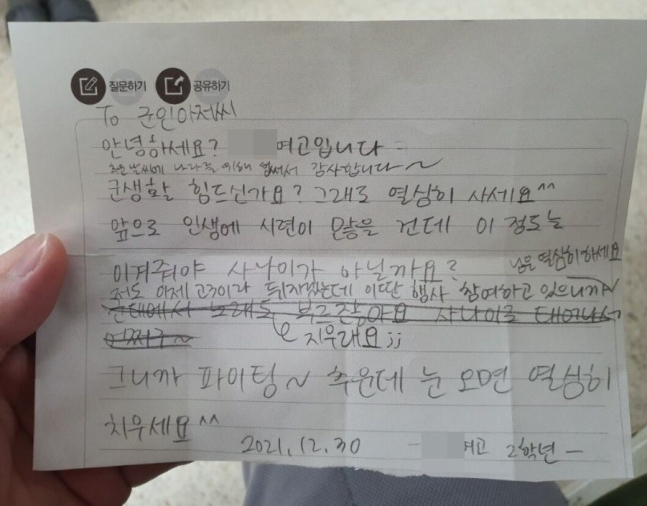[Newsmaker] Is soldier pen pal campaign past sell-by date?
Poison pen pals raise ire, but critics call practice outdated, unnecessary remnant of Japanese colonial rule
By Jo He-rimPublished : Jan. 18, 2022 - 15:14

A high school student’s sarcastic letter to a conscripted soldier sent as part of an encouragement campaign, has recently raised questions as to whether it is worth keeping the longstanding practice.
The unfriendly letter written anonymously to a conscripted soldier was first posted at an online community site on Jan. 11, with the user complaining of the message deriding the receiver.
“Is military life hard for you? Still, work hard. There will be a lot of hardships in life. Don’t you think you should be able to overcome at least this much to call yourself a man?” the writer wrote on a roughly cut lined notebook paper, dated Dec. 30, 2021.
“I am entering my senior year in high school, so my life is tough already, and I have to take part in this damn campaign. So work hard. ... When it snows, clear it well.”
While the letter’s derogatory tone sparked outrage and criticism over its perception of soldiers, the letter also brought into question the validity and appropriateness of such campaigns.
Outdated campaign
In South Korea, where all able-bodied men serve in the military for about two years under the compulsory military system, some schools having sisterhood ties with military troops run pen pal programs to boost soldiers’ morale.
But with the letter from the girls’ high school in Seoul becoming controversial, online petitions were filed to question the appropriateness of the campaign.
“In the letter guidance the school distributed, they even warned not to expose personal information, and that they may face serious danger,” the petitioner wrote on the presidential petition site.
“I think we all should know how inappropriate it is to force female students who are underage to write consolatory letters to grown men,” the petitioner added.
First posted on Jan. 12, the petition has won the support of over 141,000 people as of Tuesday.
An office worker who served in the compulsory military service 10 years ago recalled the letter campaign was more “tiresome” than encouraging.
“I also received an encouragement letter sent from a girls’ high school. It was written anonymously, and although it carried encouraging messages, they were obviously shallow words,” the 31-year-old worker, who wished to remain anonymous, told The Korea Herald.
“I remember it as a tiresome event because we (soldiers) also had to write back to the person who we do not even know.”
Others say that the campaign is outdated, as conscripted soldiers can now use smartphones and are not as closed off from society as they once were.
“Maybe these letters did help in raising the morale of soldiers in the past. But now, I wonder who would need a letter of support from strangers. They have access to the internet and their smartphones,” another office worker in Seoul said.
Vestige of Japanese colonial rule
Chin Jung-kwon, a political critic, said the public campaign to send encouragement letters to troops is a vestige of the Japanese colonial period.
“At that time, the country mandated students to write thank-you letters to Japanese soldiers fighting on the front line,” Chin said on his Facebook on Thursday.
Studies show the idea of students sending letters of encouragement to troops go way back to the Japanese colonial period of 1910 to 1945.
As Japan was fighting against China in Second Sino-Japanese War from 1937 to 1945, the Japanese Government-General of Korea at the time collected letters from young students -- especially in girls’ schools -- to boost the morale of Japanese troops, according to the study on the understanding of war of Korean and Japanese children, published by Kim Young-soon of Dankook University in 2010.
According to the study, the letter campaign was also designed for Japanese language and culture education of Korean students at the time.
The letter campaign was seen to largely decline after the democratization movements against the military government in the 1980s, according to media reports at the time, as the society sought to purge remnants of old military culture.
The school in Seoul that came under fire over the incident said it will abandon the letter campaign, which it has been conducting since 1961.
Seoul Education Office said it is currently reviewing last week’s case, and plans to send a guideline to all schools in the city advising them not to carry out “involuntary and undemocratic education on national security.”
By Jo He-rim (herim@heraldcorp.com)





![[From the Scene] Monks, Buddhists hail return of remains of Buddhas](http://res.heraldm.com/phpwas/restmb_idxmake.php?idx=644&simg=/content/image/2024/04/19/20240419050617_0.jpg&u=20240419175937)





![[Graphic News] French bulldog most popular breed in US, Maltese most popular in Korea](http://res.heraldm.com/phpwas/restmb_idxmake.php?idx=644&simg=/content/image/2024/04/18/20240418050864_0.gif&u=)



![[From the Scene] Monks, Buddhists hail return of remains of Buddhas](http://res.heraldm.com/phpwas/restmb_idxmake.php?idx=652&simg=/content/image/2024/04/19/20240419050617_0.jpg&u=20240419175937)

![[KH Explains] Hyundai's full hybrid edge to pay off amid slow transition to pure EVs](http://res.heraldm.com/phpwas/restmb_idxmake.php?idx=652&simg=/content/image/2024/04/18/20240418050645_0.jpg&u=20240419100350)

![[Today’s K-pop] Illit drops debut single remix](http://res.heraldm.com/phpwas/restmb_idxmake.php?idx=642&simg=/content/image/2024/04/19/20240419050612_0.jpg&u=)